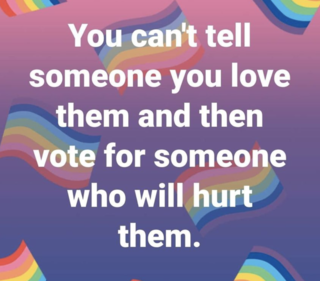President Donald Trump
Understanding the Paradox of the LGBTQ Trump Supporter
Why do people vote against their own self-interest? And what can teachers do?
Posted November 6, 2020
Three days after the 2020 election and we still have no result. It's “too close to call.” My personal disappointment at the widespread support for the past four years of pain and trauma on many communities was strong. In trying to understand this better, I have been reading and reflecting.
I read an interesting statistic yesterday that reported that between 19-45% of LGBTQ people planned to vote for Trump. This baffled me particularly after seeing so many friends post on Facebook about feeling hurt and saddened when family members vote for Trump knowing what he had done to the LGBTQ community. For example, Kevin Jennings, the CEO of Lambda Legal and co-founder of GLSEN, explained it in a Facebook post as follows:
“No, I can’t help but take your choice personally on some level. I want to break this down for you and make it very personal. Since taking office the Trump Administration has advanced many actions designed to strip me and other LGBTQ people of our rights. A few specifics include:
- Trying to ban the service of patriotic Americans who happen to be trans from our armed forces (which my organization, Lambda Legal, has so far successfully blocked in court)
- Trying to enact new rules like their so-called “conscience rule,” which would allow doctors and other medical care professionals to deny medical care to people like me because of their personal prejudices against us (which my organization, Lambda Legal, has so far successfully blocked in court)
- Appointing judges to the courts who hope to take away my right to marry
You see, the political is personal: Voting for someone who engages in such attacks on me and other LGBTQ people—attacks designed to make us second-class citizens in our own country—comes across as a personal attack. At the very least, you’re saying that other issues are more important to you than my right to be a fully equal American citizen, which tells me how little you truly care for me.
No, my voting for Biden is not the same thing as your voting for Trump. Biden isn’t seeking to take way the right of a man and a woman to marry; he’s not trying to ban straight people from our armed forces; he’s not seeking to enact rules that would allow doctors to deny straight people potentially life-saving health care. You may not like him, what he represents, and the policies he stands for, but you categorically cannot say he is trying to take away your rights based on your sexual orientation or your gender identity in the same way Trump is trying to take away those belonging to me and other LGBTQ people. Nor is he trying to do that based on your race, sex, immigration status, or a host of other issues on which his Administration has documented policies. You just disagree with him; you can’t plausibly argue he is seeking to relegate you to a second-class legal citizenship in America because of who you are. It objectively just isn’t true.”

As I thought about this, I was struck by another statistic out of the Williams Institute: Forty-one percent of LGBTQ Republicans “wish they were straight” and 38 percent viewed being queer as a “personal shortcoming.” Then instead of being angry, I got sad. I realized that these feelings are likely due to internalized homophobia caused by living in communities and going to schools that teach us to hate our queerness, that heterosexuality is the only normal and desirable way to be, and to see our identity as a personal failure.
Yesterday, in my doctoral seminar, we were discussing Bettina Love’s book, We Want to Do More Than Survive: Abolitionist Teaching and the Pursuit of Educational Freedom. In it, she explains the problems that arise when people internalize the harmful narratives of the dominant culture including Whiteness, heteronormativity, patriarchy, meritocracy, etc. This is called “system justification” and black and brown students who embrace these concepts are more likely to engage in at-risk behaviors and perform poorly in school. In his article linked above, John Jost explains more about this theory which was designed to understand why the “disadvantaged sometimes participate in their own subjugation.” In a study of the 2016 election, Jost and colleagues found:
At every level of respondent income, Trump supporters scored higher on economic and gender-specific system justification than Clinton supporters, but there were no differences in general system justification. Likewise, female as well as male supporters of Trump scored higher on economic and gender-specific (but not general) system justification, in comparison with Clinton supporters (Azevedo, Jost, & Rothmund, in press).
This lens also helped me better understand the variation in the Latinx vote this year: Some members of that community may feel that they can aspire to and benefit from the privileges of Whiteness and maleness. In order to do so, they may believe that they must distance themselves from other Latinx community members who due to their darker skin, more pronounced accents, or recent immigration stories are unable to do so. This article, "Don't Homogenize Latinx Identity," explains it beautifully. The same holds true for other men of color who may seek to continue to benefit from patriarchy even when it is often against the larger interests of their community. Jost concludes by explaining:
System justification is a potentially strong motivator of human behavior because it addresses fundamental human needs to reduce uncertainty, threat, and social discord. Rationalization of the status quo is often associated with short-term palliative psychological benefits. On an emotional level, it makes people feel better, happier, and more satisfied with the status quo (Butz, Kieslich & Bless, 2017). But there are also long-term costs in terms of decreased potential for social change and the remediation of inequality. (emphasis added)
Many people are puzzling about the election right now; I am trying to understand it from the lens of an educator who works with current and future teachers and teacher educators. How can we create learning environments and experiences that help our students feel seen, valued, and equipped to continue building a better world for all of us? It’s not a small question and one I know that lives in the hearts of many educators.
I will close with the thoughts of a colleague of mine who shared that he was feeling “great” the morning after the election. Coming from an African-American man committed to education for equity and justice, I was confused and asked what he meant. He clarified that he was not surprised by the close margins and that this election reaffirms the importance of the work we get to show up every day and do.
I appreciated this lens and wanted to send this little love letter out to all educators: Days are hard, and this week feels harder than others. However, we get to get up every day and try to make this world better: one day at a time. Please reflect on ways you may be teaching “system justification” and consider how you can equip your students to see the world differently and to engage in some Freedom Dreaming (Love, 2019) to imagine and work towards schools and a world that is truly liberatory and provides meaningful opportunities for all.
For more information and resources on Freedom Dreaming and ways to enact equity-focused teaching visit:




